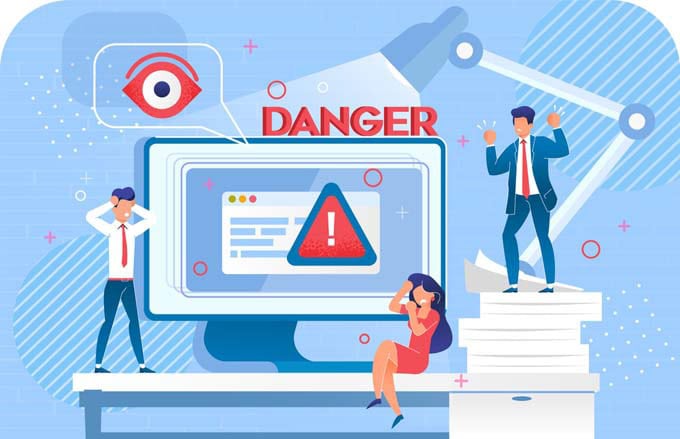"Addressing before compassion sinks in".
Volatile, uncertain, complex and characterised by ambiguity - in short: VUKA - is the environment in which bosses and their employees have to operate. Not surprising against this background is an accumulation of health consequences. In the foreground are mental illnesses, which have very different effects.

Employees can become a "risk" in different ways: The extreme case is probably when employees become a threat to colleagues or superiors - for whatever reason. Frustration, mobbing, the threat of redundancy or comparable stress situations at work form the breeding ground for unforeseeable escalations. But also private problems can lead to stress and overload at work and finally culminate in depression or other psychosomatic symptoms. And where no psychological illnesses are present, it may ultimately be an accident that occurs as a result of over-tiredness. All in all, no new phenomena, one might think. But the volatility, uncertainty, complexity and ambiguity (VUKA) have increased in the course of digitalization and ensure higher case numbers.
Absenteeism due to mental illness on the rise
More and more employees are being declared unfit for work due to mental illness. According to Dr. Niklas Baer of the Baselland Psychiatric Clinic, 75 percent of mentally ill people are employed. About one in five employees has had mental problems at some time. At least that is the result of a survey conducted by a research group led by Niklas Baer. Typical for mentally ill people: They show problems with reliability and social behavior. Although people with mental illnesses are less likely to take sick leave than those with purely physical illnesses, it takes longer due to the diffuse nature of the illness and the difficulty in assessing its course. Quite a few of those affected then become a case for disability insurance. This does not necessarily have to happen by "medical means": Since 2008, employers have also had the option of reporting an affected employee to the IV - with the employee's consent. The IV has instruments for early intervention to keep employees fit for work for as long as possible. This is because later reintegration measures into the world of work are rarely successful, with only around 25 per cent being successful.
Prevention as a management task
This makes it all the more important to identify mental illnesses as early as possible; once again, prevention is the key concept here. And managers must play a decisive role in this. Whereby: These are also increasingly under pressure of their tasks. At a conference of SIZ Care AG, a company specializing in health and absence management as well as in the care and reintegration of persons unable to work, Prof. Dr. Wolfgang Je-newein spoke on the topic of "Leadership in Change". How massive this change is, he showed with the fact that managers today work on a task for an average of 4.32 minutes, ten years ago it was still 12 minutes. According to Jenewein, leadership ability is also suffering as a result. A large part of the absenteeism within teams has its cause in the bosses. "Every boss has the absenteeism he or she deserves", is an interim conclusion by Wolfgang Jenewein. Bosses would have to become coaches again, work less as managers only with data and facts, but more as leaders with feeling. "Bosses have to change from puppeteers to expedition leaders," is one of Jenewein's recommendations.
Train resilience
On the other hand, more resilience is required, both from employees and managers. Resilience, i.e. the ability to pick oneself up again after difficult phases, is increasingly becoming a core competence in the VUKA world. And offers to train this ability are also on the rise. One such resilience trainer is Claudia Kraaz, who also spoke at the SIZ Care AG conference mentioned above. There, she particularly pointed out the strengthening of resilience as a leadership task. Managers have to empower and strengthen employees by better specifying the "what" and not the "how". It is increasingly important to train employees in the area of stress competence. But this is only one side of the coin: above all, the positive esteem in which managers hold their employees contributes greatly to stress prevention. According to Claudia Kraaz, it is important to offer constructive criticism. And a particularly important characteristic of managers is the ability to listen. Under no circumstances should bosses simply pass on the pressure: "Managers must be able to withstand pressure. After all, they are also better paid for it," says Claudia Kraaz.
Seek dialogue in good time
So how can scenarios like the ones mentioned above be prevented? If, for example, an employee's behavior at work changes or colleagues complain about it, supervisors should react. The right thing to do is to talk to the person concerned before an emotional strain can fully develop into an illness or cause the situation to escalate in some other way. "Address before the sympathy sinks", says psychologist Niklas Baer. He knows: "Early recognition is usually not a problem, but talking about it is. Bosses want to help, but are reluctant to intervene succinctly." One such intervention could be to relieve employees who are showing signs of burnout in good time. In such a case, effective substitution rules are helpful - without, however, creating new potential for overload in a team. Creating additional resources usually costs money. But it is important to weigh up what is ultimately more expensive: turning a blind eye to it and only waking up when absenteeism has reached an intolerable level.









